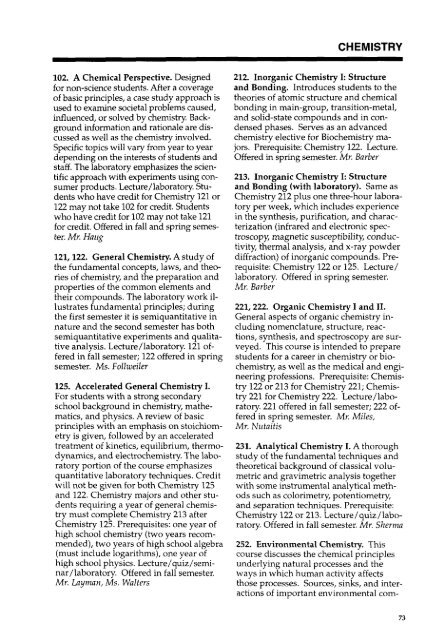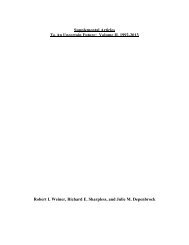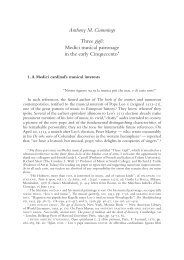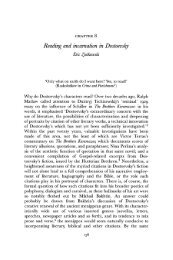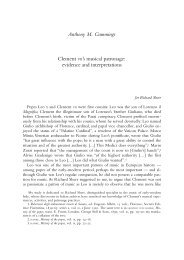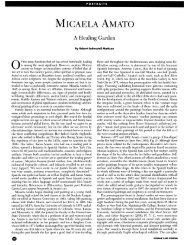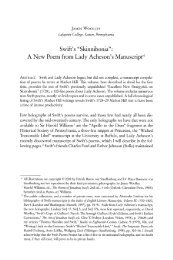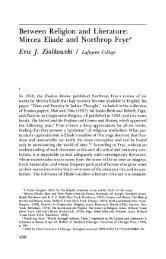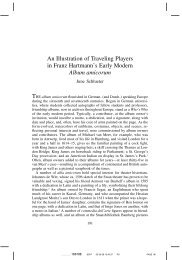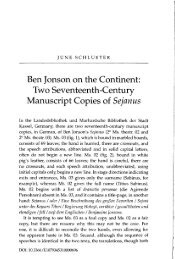courses of instruction - Lafayette College
courses of instruction - Lafayette College
courses of instruction - Lafayette College
You also want an ePaper? Increase the reach of your titles
YUMPU automatically turns print PDFs into web optimized ePapers that Google loves.
102. A Chemical Perspective. Designed<br />
for non-science students. After a coverage<br />
<strong>of</strong> basic principles, a case study approach is<br />
used to examine societal problems caused,<br />
influenced, or solved by chemistry. Back<br />
ground information and rationale are dis<br />
cussed as well as the chemistry involved.<br />
Specific topics will vary from year to year<br />
depending on the interests <strong>of</strong> students and<br />
staff. The laboratory emphasizes the scien<br />
tific approach with experiments using con<br />
sumer products. Lecture/laboratory. Stu<br />
dents who have credit for Chemistry 121 or<br />
122 may not take 102 for credit. Students<br />
who have credit for 102 may not take 121<br />
for credit. Offered in fall and spring semes<br />
ter. Mr. Haug<br />
121,122. General Chemistry. A study <strong>of</strong><br />
the fundamental concepts, laws, and theo<br />
ries <strong>of</strong> chemistry, and the preparation and<br />
properties <strong>of</strong> the common elements and<br />
their compounds. The laboratory work il<br />
lustrates fundamental principles; during<br />
the first semester it is semiquantitative in<br />
nature and the second semester has both<br />
semiquantitative experiments and qualita<br />
tive analysis. Lecture/laboratory. 121 <strong>of</strong><br />
fered in fall semester; 122 <strong>of</strong>fered in spring<br />
semester. Ms. Follweiler<br />
125. Accelerated General Chemistry I.<br />
For students with a strong secondary<br />
school background in chemistry, mathe<br />
matics, and physics. A review <strong>of</strong> basic<br />
principles with an emphasis on stoichiom-<br />
etry is given, followed by an accelerated<br />
treatment <strong>of</strong> kinetics, equilibrium, thermo<br />
dynamics, and electrochemistry. The labo<br />
ratory portion <strong>of</strong> the course emphasizes<br />
quantitative laboratory techniques. Credit<br />
will not be given for both Chemistry 125<br />
and 122. Chemistry majors and other stu<br />
dents requiring a year <strong>of</strong> general chemis<br />
try must complete Chemistry 213 after<br />
Chemistry 125. Prerequisites: one year <strong>of</strong><br />
high school chemistry (two years recom<br />
mended), two years <strong>of</strong> high school algebra<br />
(must include logarithms), one year <strong>of</strong><br />
high school physics. Lecture/quiz/semi<br />
nar/laboratory. Offered in fall semester.<br />
Mr. Layman, Ms. Walters<br />
CHEMISTRY<br />
212. Inorganic Chemistry I: Structure<br />
and Bonding. Introduces students to the<br />
theories <strong>of</strong> atomic structure and chemical<br />
bonding in main-group, transition-metal,<br />
and solid-state compounds and in con<br />
densed phases. Serves as an advanced<br />
chemistry elective for Biochemistry ma<br />
jors. Prerequisite: Chemistry 122. Lecture.<br />
Offered in spring semester. Mr. Barber<br />
213. Inorganic Chemistry I: Structure<br />
and Bonding (with laboratory). Same as<br />
Chemistry 212 plus one three-hour labora<br />
tory per week, which includes experience<br />
in the synthesis, purification, and charac<br />
terization (infrared and electronic spec-<br />
troscopy, magnetic susceptibility, conduc<br />
tivity, thermal analysis, and x-ray powder<br />
diffraction) <strong>of</strong> inorganic compounds. Pre<br />
requisite: Chemistry 122 or 125. Lecture/<br />
laboratory. Offered in spring semester.<br />
Mr. Barber<br />
221, 222. Organic Chemistry I and II.<br />
General aspects <strong>of</strong> organic chemistry in<br />
cluding nomenclature, structure, reac<br />
tions, synthesis, and spectroscopy are sur<br />
veyed. This course is intended to prepare<br />
students for a career in chemistry or bio<br />
chemistry, as well as the medical and engi<br />
neering pr<strong>of</strong>essions. Prerequisite: Chemis<br />
try 122 or 213 for Chemistry 221; Chemis<br />
try 221 for Chemistry 222. Lecture/labo<br />
ratory. 221 <strong>of</strong>fered in fall semester; 222 <strong>of</strong><br />
fered in spring semester. Mr. Miles,<br />
Mr. Nutaitis<br />
231. Analytical Chemistry I. A thorough<br />
study <strong>of</strong> the fundamental techniques and<br />
theoretical background <strong>of</strong> classical volu<br />
metric and gravimetric analysis together<br />
with some instrumental analytical meth<br />
ods such as colorimetry, potentiometry,<br />
and separation techniques. Prerequisite:<br />
Chemistry 122 or 213. Lecture/quiz/labo<br />
ratory. Offered in fall semester. Mr. Sherma<br />
252, Environmental Chemistry. This<br />
course discusses the chemical principles<br />
underlying natural processes and the<br />
ways in which human activity affects<br />
those processes. Sources, sinks, and inter<br />
actions <strong>of</strong> important environmental com-


